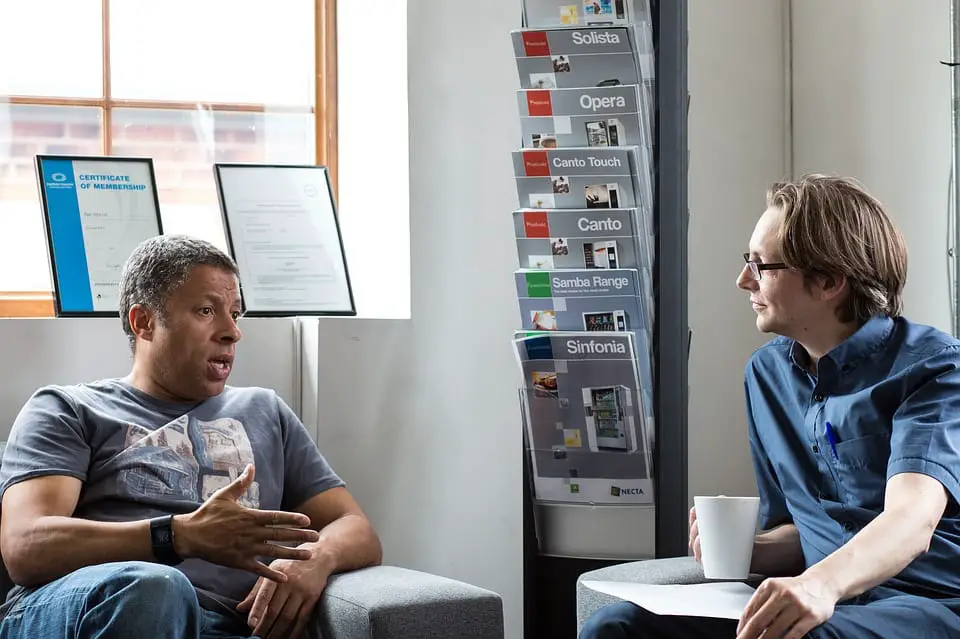Table of Contents
*This post may contain affiliate links. As an Amazon Associate we earn from qualifying purchases.
Empathetic listening is beneficial for all involved and is completely different from typical listening. The word “empathy” has been around for about a century and means “feeling-in.”
The modern definition of empathy is a willingness to understand what another person is experiencing. It’s an emotional exercise that opens you up to feeling compassion for someone else. Empathy can even be used to understand history better. It’s no secret that this is a powerful tool, but why is it important for your team?
What is Empathetic Listening?
Empathy is the ability to feel how others are feeling, put yourself in their shoes, and try to understand where they are. That is a critical ability in sports and brings benefits to athletes, coaches, and parents. Studies show that consolation can reduce stress hormones. In other words, empathetic listening can be calming and healing.
How does this help with sports? Empathy can be the difference between pushing through to win the game or giving up. A coach who takes the time to empathize with their team can be an inspiration for their athletes, an effective leader who increases their feelings of self-worth and confidence.
Empathetic listening gives the speaker space to feel understood. As the listener, you’re sending the message that you understand their problem and are there for them without judgment. That sentiment conveys through words as well as non-verbal communication.
By assuming the role of the empathetic listener, you’re encouraging the athlete to express themselves freely without fear of repercussions. That doesn’t mean you have to agree with everything they’re saying, but that you’re there to lend a supportive ear.
The Necessity of Empathy in Sports

Bosses and parents who engage in empathetic listening can have a profound effect on their children. People in leadership roles can take their positions to the next level by participating in this simple emotional exercise. Empathetic listening is a powerful skill for a coach that allows athletes to trust their team and trust themselves.
Benefits of Empathetic Listening
Empathetic listening, also known as reflective listening, is a method of being there for someone that involves trust and understanding. This skill enables the listener not only to receive but also to interpret the other person’s message and respond effectively. Responding is an essential aspect of listening and impacts the overall exchange.

Empathetic listening can also do the following things:
Build respect and trust
When your team members know they can come to you without fear of judgment or punishment, they’ll immediately trust and respect you in a whole new way. That’s more effective than fear-based leadership techniques, which are harmful both in workplaces and sports.
Reduce tension and stress
Pent-up emotions need to find release, or they can lead to more issues down the road. By engaging in empathetic listening, you’re giving your team members an outlet to reduce tension and stress, which can hinder athletic ability.
Develop emotional intelligence
Emotional intelligence is all about recognizing and identifying emotions and being able to channel them productively. Empathetic listening can help you in this regard because you’ll be spending more time learning how others feel and gaining familiarity with emotion. And considering how important emotional intelligence is in today’s world, this is an undeniable benefit.
Increase self-awareness
Self-awareness is a key aspect of personal development. Being an empathetic listener can increase your own self-awareness and that of the people you listen to. When you listen in a real and active way, you’re resisting the urge to interrupt or talk over the other, which requires focus. That makes you more self-aware and helps them because they can share their unhindered stream of thought, learning about themselves in the process.
Active Listening and Well-Being

The need to feel like you belong is foundational in human beings, both as children and adults. People want to feel understood and liked and will go to great lengths to achieve this feeling. Research in positive psychology has proven that positive interactions with others improve well-being and contentment.
While active and empathetic listening may not come naturally to everyone, it’s a skill worth developing because it can positively benefit both the listener and the speaker. Healthy social interactions are crucial not only for success in athletics but for fulfillment and success in life.
Components of Active and Empathetic Listening
Empathetic listening is essentially listening with mindfulness. Have you ever had a person talk to you only to realize a couple of minutes in that you didn’t catch the last half of their sentence because you got distracted? Mindful listening means preventing this from happening and focusing your awareness on their words. Here are some components of active and empathetic listening:

Non-judgment
When you listen to someone, there isn’t a need to evaluate their statements or figure out whether you agree or disagree. Listening with non-judgmental awareness merely means giving them space to explore their thoughts and ideas. When you become a skilled active listener, you’ll be able to receive what the speaker is saying without responding in a biased way or judging them.
Respectful quiet
In an unbalanced or non-empathetic conversation, there are almost no moments of silence. When you’re genuinely engaged in listening to another person, you don’t have to fill every second with words. Respectful quiet can provide an open door for a deeper understanding, allowing the speaker to reflect on their thoughts. Wait until you’re sure they’re done exploring their thought before interjecting.
Summarizing
Summarizing what the speaker has said is another important component of true listening. When you repeat back what they’ve already said, but use your own words, you’re showing that you not only listened to them but took the time to interact with the information and commit it to memory. You’ll prove you’re following the conversation and value their ideas. When you’re sure the speaker is done sharing their thought, summarize it to make sure you interpreted correctly.
Showing attentiveness
While it is tempting to want to give your perspective after another person has given theirs, the way that you go about giving that perspective is absolutely crucial. When you respond to what they’ve said, make sure your statements show attentiveness. You can do this by using empathizing words, such as “That must have been very frustrating” or “I can see why you’d be upset about that.” Being acknowledged is very important for psychological health.
How to Tell You’re Not a Great Listener

Communication involves the sender, the message, and the receiver, along with any distractions present at the time. Listening isn’t just a passive act, but an active process that requires attention and focus. While a lot of people believe they’re great listeners, empathetic listening involves more than just waiting for your turn to speak.
Again, empathetic listening doesn’t come naturally to everyone, so it’s important to figure out whether your listening skills need work. Let’s look at some common mistakes of people who aren’t great at listening.
Daydreaming
Just because you’re looking at someone as they speak doesn’t mean you’re truly listening. If you’re lost in your mind reviewing your list of chores or reminding yourself to call someone back later, you’re allowing yourself to get distracted instead of being present for that person.
Judging
Empathetic listening means receiving what the speaker says without condemning them for it. Listening to someone while also judging them for what they say is the opposite of listening with true empathy.
Planning
If you’re “listening” to someone while planning out what you’re going to say next, you aren’t t ruly listening. It’s a bad habit that many people engage in and it gets in the way of truly connecting or empathizing with each other.
Any time you catch yourself engaging in one of the habits above, you aren’t being mindful in your interaction. Without actively working on being a good listener, it’s difficult (or even impossible) to have a real conversation that encourages mutual understanding. Instead, you’re approaching the interaction with a goal in mind and allowing the conversation to deteriorate. Thankfully, there are solutions to this.
How to Become a More Empathetic Listener
If, while reading the section above, you realized that you’re not as great of a listener as you thought, have no fear. You can teach yourself empathetic listening as a way to avoid conflict, manage emotions in your team members, and have more success with sports. First, we’ll summarize the steps in empathetic listening, and then go deeper with techniques to improve in it.

- Give your full attention to the speaker instead of trying to multi-task
- Resist the urge to judge, trivialize, or minimize what they’re saying
- Pay attention to the feelings behind what the speaker is saying and try to identify what the emotions are
- Don’t interrupt or feel the need to respond immediately. Allow the speaker to finish talking
- Ask questions if you have doubts about the meaning behind certain words and to show you were listening
Tips for Empathetic Listening

The following are some tips to help you become an emphatic listener.
Speak in a softer voice
Studies show that tone of voice is an important factor in how someone will receive feedback. When you give your input after listening and take the time to use a supportive and warm tone, your team member will leave the interaction with a more positive feeling. That is true even when you’re delivering negative news.
Ask for input
You can encourage empathetic listening all the time and not only when someone comes to you with an issue. During practices or after games, make a habit of asking your team members for their feelings or perspectives on what happened. That will not only give you opportunities to listen more often but will provide you with valuable information about the athletes.
Pay attention to body language
Listening is about far more than how you respond verbally to the speaker. You can engage in eye contact to show you’re listening, as well as face the speaker to show that they have your full attention. You can also make sounds in between their sentences to indicate that you’re still paying attention.
Practice mindfulness
Empathetic listening involves listening with full mindfulness, which can be a challenge if you haven’t practiced it before. You may want to look into meditation or simply mindful breathing as a way to improve your listening skills. You’ll pay better attention to what the speaker is saying instead of getting distracted by your own thoughts.
Notice subtleties
Pay attention to subtle shifts in the speaker’s voice, the feelings behind their words, and patterns in how they share their thoughts. Try to look deeper into these subtleties as a way to better understand their thoughts and emotions. Allow your thoughts and feelings to take a backseat as you listen actively.
As you actively engage in listening with non-judgment, eventually your team members will feel great about coming to you with their issues. You’ll prevent a lot of potential problems from occurring and improve the sport for everyone involved. As you can see, empathetic listening really is a key component in sports.
Ready to Take Your Listening Skills to the Next Level?
When you take the time to show your athletes that they are listened to, trusted, and respected, it will encourage mutual trust. It can be tough to struggle with intense emotions such as embarrassment from missing a goal to frustration at losing a game. Although empathetic listening can be a challenge to master, at first, and will take some time, it’s well worth your effort.

Remember that each team member is a unique individual with their own difficulties and that, by being an empathetic listener, you can improve these struggles and let them grow as an athlete. You will, as a result, improve your future games and the bond between you and the team.

